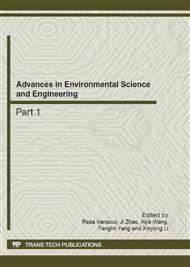p.575
p.579
p.584
p.589
p.594
p.598
p.604
p.608
p.614
Investigation and Application of New Polyamine Salt Inhibitor
Abstract:
A new kind of polyamine salt inhibitor (code name BH-JAI) with low molecular weight, was synthesized and evaluated in the lab. The tests showed that BH-JAI could suppress the hydration and dispertion of reactive claystone effectively, compatible with organic salt or KCl water drilling fluid, and could play its role of inhibition even at temperature as high as 200°C. The field tested in 5 wells suggested that the new polyamine salt could enhance the inhibition ability of drilling fluids obviously, and reduce downhole complex accidents such as sloughing and tight hole efficiently.
Info:
Periodical:
Pages:
594-597
Citation:
Online since:
May 2012
Authors:
Price:
Сopyright:
© 2012 Trans Tech Publications Ltd. All Rights Reserved
Share:
Citation:


